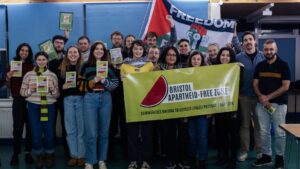Stephen is one of more than a hundred pro-Palestine volunteers in a resident-led campaign that has knocked on every door in the Easton and St Paul’s areas of Bristol, come rain or shine.
“What door knocking can do is shake you from the slumber of any feelings of helplessness that you might have when you see what’s happening in Palestine,” he tells Middle East Eye.
A volunteer from the Bristol Apartheid-Free Zone Campaign, which has signed up over 1,800 households to a pledge to not buy Israeli fresh produce.
It aims to create a mandate that encourages high street businesses to join the boycott.
Nearly 50 shops and businesses stocking fresh produce have joined so far, and the campaign boasts a 50 percent sign-up rate among those who open the door, which the campaigners say is an “unprecedented” rate for door-to-door canvassing.
“On the doorstep, solidarity with Palestine is the overwhelming norm, so a big part of the campaign has just been trying to make that solidarity public and visible,” Stephen says.
The campaign strategy has been drawn from Bristol’s history of anti-apartheid resistance, being inspired by the success of the St Pauls Apartheid-Free Zone.
In the 1980s, that campaign organised a local boycott of goods linked to South African apartheid that was influential in spurring nationwide boycotts by various retailers.
The campaign also builds on a climate of growing local animosity toward Labour Party policies in Gaza, which former MP Thangham Debbonaire has blamed for the loss of her Bristol Central seat to Green Party Leader Carla Denyer in July 2024.
But the strategy has gained momentum across the UK, with similar Apartheid-Free Zone campaigns beginning in Cardiff, Sheffield, Belfast, Glasgow, Newham and Thanet in Kent.
“Most of the people involved in door knocking aren’t people who have any prior experience doing political canvassing, and many wouldn’t even call themselves particularly political people,” explains Stephen.
“It never fails to amaze me how quickly people pick it up. It’s really just people speaking in a sort of neighbour-to-neighbour capacity.”


